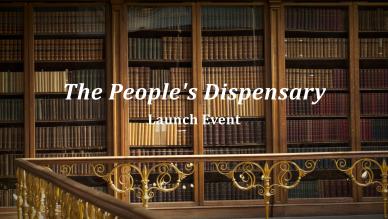


The People's Dispensary - Launch Event
Wednesday 9 July
Are you a Fellow or a Member? Sign in to get member prices
Launch Overview
Doors open at 1:30pm, with hot drinks available.
From 2pm to 4pm Professor Gayle Davis (University of Edinburgh) will chair as Dr Daisy Cunynghame (Royal College of Physicians of Edinburgh), Professor Keir Waddington (Cardiff University), Professor Samantha Williams (University of Cambridge) and Professor Bernard Harris (University of Strathclyde) present their papers.
From 4pm to 5pm there will be a social hour with hot drinks and nibbles.
An exhibition that includes eighteenth century medicine bottles and archive material related to the Edinburgh Public Dispensary will also be on display.
The People's Dispensary Online Resource
In 1776 the Edinburgh Public Dispensary was established by Andrew Duncan.
The People's Dispensary online resource is made up of the case notes dating from the earliest years of the dispensary’s operation – detailing over a decade of patient care. The notes provide a detailed account of the diseases, treatments and experiences of eighteenth century Edinburgh’s sick poor.
This resource, developed by the Royal College of Physicians of Edinburgh, not only presents the case notes of Andrew Duncan as he wrote them, but also translates his shorthand notation into more understandable language. The development of this online database was funded entirely by donations.
Speakers
Dr Daisy Cunynghame (Royal College of Physicians of Edinburgh)
Daisy Cunynghame completed an MA in Modern History at the University of St Andrews and a Higher Diploma in Archival Studies at University College Dublin. She is the Heritage Manager & Librarian for the Royal College of Physicians of Edinburgh. She was awarded her PhD by the University of Edinburgh in 2020. The focus of this work was ‘The Roles of the Edinburgh, Kelso, and Newcastle Dispensaries in Charitable Relief, 1776-1810’. Her research investigates public health initiatives in the late eighteenth and early nineteenth centuries in Scotland and the north of England, with a particular focus on the patient experience within the dispensary system.
This presentation will explore the archives of the Edinburgh Public Dispensary and demonstrate the ‘The People’s Dispensary’ database, the range of information it contains and the many ways in which this resource can be interrogated and used for research.
Professor Keir Waddington (Cardiff University)
Keir Waddington is at heart a Victorianist who works at the intersection of the social history of medicine and environmental history. He has been at Cardiff University for 25 years and his books and research has explored the history of hospitals, the history of psychiatry, public health, food and disease, and most recently how nineteenth century communities responded to the environmental problems they faced. He is author of 'A Social History of Medicine: Europe since 1500' but always find people want to talk about sausages having written an article on ‘The Dangerous Sausage’. He also works on bad Gothic fiction and what it can tell us about attitudes to medicine and science in the past.
Drama and discovery always generate interest and attention. And medicine appeared to offer a lot of drama in the nineteenth century from new procedures in the operating theatre and the introduction of new therapies and treatments to the interest and alarm expressed about what went on in the medical laboratory. Medical news of ‘advances’ fascinated contemporaries given their appetite for spectacle and their interest in progress and modernity. However, for many patients and their families in the nineteenth century their experiences of medicine did not always match this picture of innovation. Their experiences were more mundane. What did everyday medicine look like? In this talk, Professor Keir Waddington will focus not on the dramatic or new advances but on the everyday features of medicine and the medical treatments might receive in the home or from a dispensary.
Professor Samantha William (University of Cambridge)
Samantha Williams is Professor of Social History at the University of Cambridge. She is author of two monographs, 'Poverty, gender and life-cycle under the English Poor Law, 1760-1834' (Royal Historical Society, Boydell and Brewer, 2011) and 'Unmarried motherhood in London, 1700-1850: pregnancy, the poor law and provision' (Palgrave Macmillan, 2018), as well as co-editor of 'Illegitimacy in Britain 1700-1920' (Palgrave Macmillan, 2005). She is writing a history of the English workhouse, 1690-1834 with Professors Susannah Ottaway and Alannah Tomkins.
This talk will explore the widespread provision of poor relief and medical care under the Old Poor Law. By the mid seventeenth century, the poor could live off poor relief and by the eighteenth century the poor law was a major provider of medical relief given to the poor for free. Workhouses also became significant sites of medical assistance as they devoted wards to the sick poor and built purpose-built infirmaries.
Professor Bernard Harris (University of Strathclyde)
Bernard Harris is Professor of Social Policy at the University of Strathclyde. He has published widely on different aspects of the history of health and social welfare, including books on the history of school medical provision, the development of the British welfare state, and ‘the changing body’. This presentation builds on work which has been undertaken as part of a wider investigation into the role of voluntarism within the NHS since 1948. The project has been co-directed with Professors John Mohan, Ellen Stewart and Martin Gorsky with the generous support of the Wellcome Trust.
Charity has always played an important part in the history of health care in the UK, including the provision of charitable support for both hospitals and their patients. However, after 1945, the establishment of the ‘classic welfare state’ was supposed to usher in a new era of state provision. This presentation asks how the advent of the welfare state affected the role of charities for the ‘sick poor’. It aims to show how these organisations adapted to the expansion of statutory welfare and the different ways in which they interacted with public agencies.
Event information
Are you a Fellow or a Member? Sign in to get member prices




